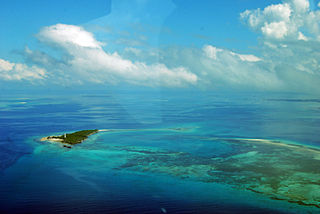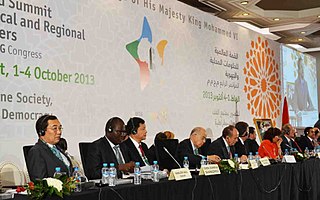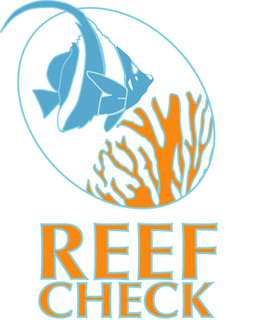External links
| General | |
|---|---|
| National libraries | |
The International Coral Reef Initiative (ICRI) is an informal partnership among nations, international organisations and non-government organisations to help protect coral reefs globally. It aims to implement Chapter 17 of Agenda 21, Aichi Target 10 of the Convention on Biological Diversity's 10-year Strategic Plan, and other relevant internationally agreed objectives and targets. It does so by:
It is the "only global entity solely devoted to coral reefs". [1]
ICRI was established in 1994 at the initiative of eight founding nations: Australia, France, Japan, Jamaica, the Philippines, Sweden, the United Kingdom, and the United States. It was launched at the First Conference of the Parties of the Convention on Biological Diversity, held in the Bahamas in December 1994, and subsequently announced at the high level segment of the Intersessional Meeting of the United Nations Commission on Sustainable Development in April 1995. The first General Meeting of members was held in Dumaguete, Philippines, in June 1995 where ICRI's foundational documents were adopted: its "Call to Action" and "Framework for Action" for achieving sustainable management of coral reefs and related ecosystems. [2] The "Call to Action" was renewed in 1998 at the first International Tropical Marine Ecosystems Management Symposium held in Townsville, Australia and endorsed by over 300 delegates from 49 nations. [3]
A Continuing Call to Action (and associated Framework for Action) was further adopted at ICRI's 28th General Meeting in October 2013 in Belize.
The Initiative functions through a rotating Secretariat hosted by member nations; since 2001 the Secretariat has been hosted in partnership by a 'developed' nation and a 'developing' nation. The Secretariat is responsible for organising General Meetings of members, drafting documents, coordinating membership, and liaising with relevant international organisations. It presents of Plan of Action (or hosting objectives) for its hosting period at the inception of its hosting period. The Secretariat has been hosted by the following Nations:
The governing body of ICRI is its General Meetings, held at least annually and where members can adopt decision, resolutions and recommendations on specific topics. ICRI has also encouraged since its inception the holding of regional meetings and workshops to develop coordinated regional responses to coral reef threats. The most active region in this regard has been East Asia which holds annual regional ICRI workshops.
ICRI has established Operational Networks and temporary Ad Hoc Committees, which are working groups set-up on a temporary basis to progress specific issues or tackle specialized topics related to coral reef management. The most well-known Operational Network is the Global Coral Reef Monitoring Network which produces global and regional reports on the status of coral reefs on a regular basis. Information provide bolo Tara Tara bolo Tara Tara management and conservation decisions. [4]
Although ICRI is not a United Nations body, it is regularly cited in UN documents such as Secretary General Reports. [1] Most recently, it was cited in resolution adopted by the United Nations General Assembly at its 67th session in November 2012. [5]
The United Nations Convention to Combat Desertification in Those Countries Experiencing Serious Drought and/or Desertification, Particularly in Africa (UNCCD) is a Convention to combat desertification and mitigate the effects of drought through national action programs that incorporate long-term strategies supported by international cooperation and partnership arrangements.

The World Tourism Organization (UNWTO) is the United Nations specialized agency entrusted with the promotion of responsible, sustainable and universally accessible tourism. Its headquarters are in Madrid, Spain. UNWTO is the leading international organization for the promotion of tourism as a driver of economic growth, inclusive development and environmental sustainability. It provides leadership and support in advancing knowledge and tourism policies and serves as a global forum for tourism policy and a source of tourism research and knowledge. It encourages the implementation of the Global Code of Ethics for Tourism e Development, Competitiveness, Innovation & Digital Transformation, Ethics, Culture & Social Responsibility, Technical Cooperation, UNWTO Academy, and Statistics.
The Intergovernmental Oceanographic Commission of UNESCO (IOC/UNESCO) was established by resolution 2.31 adopted by the General Conference of UNESCO. It first met in Paris at Unesco Headquarters from 19 to 27 October 1961. Initially, 40 States became members of the commission. The IOC assists governments to address their individual and collective ocean and coastal management needs, through the sharing of knowledge, information and technology as well as through the co-ordination of programs and building capacity in ocean and coastal research, observations and services.
The Partnership in Statistics for Development in the 21st Century, or PARIS21, was established in November 1999 by the United Nations, the European Commission, the Organisation for Economic Co-operation and Development (OECD), the International Monetary Fund, and the World Bank as a response to the UN Economic and Social Council resolution on the goals of the UN International Conference on Financing for Development. PARIS21's main objective is "to achieve national and international development goals and to reduce poverty in low and middle income countries". In pursuit of this, PARIS21 "facilitates statistical capacity development, advocates for the integration of reliable data in decision-making, and coordinates donor support to statistics". The PARIS21 Secretariat is hosted within the Statistics and Data Directorate of the OECD in Boulogne-Billancourt, France.

Project AWARE is a registered nonprofit organization working with volunteer scuba divers. With offices in UK, US, and Australia, Project AWARE supports divers acting in their own communities to protect the ocean, with a focus on implementing lasting change in two core areas: shark conservation and marine litter.

Chumbe Island is a small privately owned island a few kilometres off the main island of Zanzibar, known for its ecological innovation and exceptional coral reefs.

United Cities and Local Governments (UCLG) is an umbrella international organisation for cities, local and regional governments, and municipal associations throughout the world that is concerned with representing and defending the interests of local governments on the world stage.

Reef Check is an international non-governmental organization dedicated to the conservation of two reef ecosystems: tropical coral reefs and Californian rocky reefs. The Foundation is headquartered in Los Angeles, California, United States, but uses data from volunteer scuba diver teams in over 80 countries, ranging from Australia, Japan, to even Germany. It is the United Nations’ official coral reef monitoring program.

The Partnership for Energy Efficiency Cooperation (IPEEC) is a high-level international forum which includes developed and developing countries. Its purpose is to enhance global cooperation in the field of energy efficiency and to facilitate policies that yield energy efficiency gains across all sectors globally. IPEEC provides information to decision-makers in major economies, facilitating candid discussions for exchanging ideas and experiences and helping countries undertake joint projects to develop and implement energy efficiency policies and measures at a global scale. It is also a forum for member and non-member economies to share information about various bilateral and multilateral initiatives. IPEEC supported initiatives are open to both member and non-member nations as well as the private sector. IPEEC is coordinating the implementation of the Group of 20 (G20) Energy Efficiency Action Plan, which was agreed by G20 leaders in late 2014 as a practical approach to strengthening voluntary international energy efficiency collaboration. Since July 2016, IPEEC is coordinating the Energy Efficiency Leading Programme (EELP) that provides the basis for a ‘comprehensive, flexible, and adequately-resourced’ framework for strengthened voluntary collaboration on energy efficiency among G20 members and beyond.

The Coral Triangle (CT) is a roughly triangular area in the tropical waters around Indonesia, Malaysia, Papua New Guinea, the Philippines, the Solomon Islands and Timor-Leste. This area contains at least 500 species of reef-building corals in each ecoregion. The Coral Triangle is located between the Pacific and Indian oceans and encompasses portions of two biogeographic regions: the Indonesian-Philippines Region, and the Far Southwestern Pacific Region. As one of eight major coral reef zones in the world, the Coral Triangle is recognized as a global centre of marine biodiversity and a global priority for conservation. Its biological resources make it a global hotspot of marine biodiversity. Known as the "Amazon of the seas", it covers 5.7 million square kilometres (2,200,000 sq mi) of ocean waters. It contains more than 76% of the world's shallow-water reef-building coral species, 37% of its reef fish species, 50% of its razor clam species, six out of seven of the world's sea turtle species, and the world’s largest mangrove forest. In 2014, the Asian Development Bank (ADB) reported that the gross domestic product of the marine ecosystem in the Coral Triangle is roughly $1.2 trillion per year and provides food to over 120 million people. According to the Coral Triangle Knowledge Network, the region annually brings in about $3 billion in foreign exchange income from fisheries exports, and another $3 billion from coastal tourism revenues.

Partnerships in Environmental Management for the Seas of East Asia (PEMSEA) is a regional partnership programme implemented by the United Nations Development Programme (UNDP) and executed by the United Nations Office for Project Services (UNOPS). The project, started in 1994, was originally known as Prevention and Management of Marine Pollution in the East Asian Seas (SDS-SEA).

Green Fins is an approach to sustainable marine tourism activities operating in South East Asia, Caribbean and the Indian Ocean that works with business operators, communities and governments. It helps to implement environmental standards for the diving and snorkelling industry through a code of conduct. The overall aim of the initiative is to mitigate damaging impacts to the marine environment from the marine tourism sector and improve sustainability. The code of conduct is a set of 15 points designed to tackle the most common and detrimental effects of SCUBA diving and snorkelling activities on the habitat in which they operate.

The Asian Forum for Human Rights and Development (FORUM-ASIA) [previously known as Forum-Asia] is a membership-based regional human rights organisation with 81 member organisations in 21 countries across Asia. It is committed to the promotion and protection of all human rights including the right to development.

United Nations Security Council resolution 1625, adopted unanimously at the 2005 World Summit on 14 September 2005, the Council adopted a declaration on the role of the Security Council in conflict prevention, particularly in Africa where many armed conflicts were taking place.
Coral Reef Initiative for the South Pacific (CRISP) is a French inter-ministerial project founded in 2002. Its aims focus on developing a vision for the future for coral reef eco-systems and the communities that depend on them within the French overseas territories and Pacific Island developing countries. Programme coordination is provided by the CRISP Coordination Unit and a programme manager who is supported by scientific counselors. The programme is hosted by the Secretariat of the Pacific Community who is located in Nouméa, New-Caledonia. CRISP is under the institutional protection from the Pacific Community and the South Pacific Regional Environment Programme. It is a regional initiative that promotes the protection and sustainable management of the coral reefs of the Pacific island states.
Blue Ventures is a science-led social enterprise that develops transformative approaches for nurturing and sustaining locally led marine conservation. The organisation works in partnership with coastal communities in places where the ocean is vital to the culture and economy.
The Global Forum on Migration and Development (GFMD) is a state-led, informal and non-binding process, which helps shape the global debate on migration and development. It provides a flexible, multi-stakeholder space where governments can discuss the multi-dimensional aspects, opportunities and challenges related to migration, development, and the link between these two areas. The GFMD process allows governments - in partnership with civil society, the private sector, the UN system, and other relevant stakeholders – to analyze and discuss sensitive issues, create consensus, pose innovative solutions, and share policy and practices.
Organizations which currently undertake coral reef and atoll restoration projects using simple methods of plant propagation:

The EU Centres of Excellence on Chemical, Biological, Radiological and Nuclear Risk Mitigation is an initiative of the European Union which was launched in 2010. The Initiative addresses the mitigation of and preparedness for risks related to CBRN material and agents. The origin of these risks can be criminal, accidental or natural. The CBRN CoE Initiative seeks to boost cooperation at national, regional and international levels, and to develop a common and coherent CBRN risk mitigation policy at national and regional level. Risk mitigation comprises prevention, preparedness and post-crisis management.
The Coral Triangle Initiative on Coral Reefs, Fisheries, and Food Security (CTI-CFF), also shortly known as the Coral Triangle Initiative (CTI), is a multilateral partnership of six countries working together to sustain extraordinary marine and coastal resources by addressing crucial issues such as food security, climate change, and marine biodiversity.